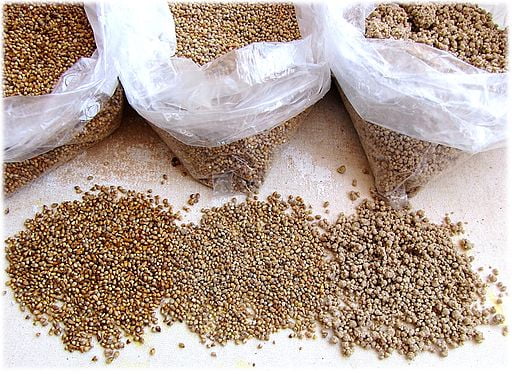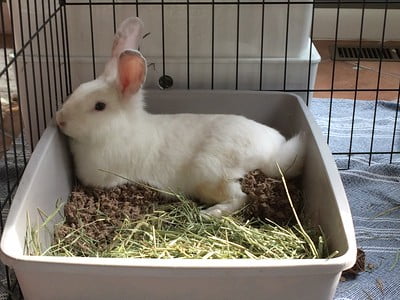Last Updated on February 22, 2023 by Marjon Ramos
Eggs should never be intentionally fed to rabbits because rabbits are herbivores, meaning they are not designed to digest eggs.
Eggs are also high in protein and fat, both of which are not recommended to be given to rabbits in large amounts.
Feeding your rabbit’s eggs could lead to digestive problems like diarrhea, GI stasis, hepatic lipidosis, and soft uneaten cecotropes.
While it’s unlikely that your rabbits would die from taking a small bite of eggs, you should never make this a habit.
Observe your rabbit for signs of a digestive problem or any changes in their behavior or poop after accidentally eating small amounts of eggs.
Now that I’ve given you the gist of the article, read on as I explain why rabbits can’t eat eggs:
Table of Contents
Risk of feeding eggs to rabbits.
Rabbits are herbivores, they are not really designed to digest large amounts of eggs.
Here are some of the risks associated with feeding your rabbits large amounts of eggs:
Fatty liver disease
Eggs are high in fat, feeding your rabbits eggs long-term could lead to hepatic lipidosis, or fatty liver disease.
A rabbit’s diet should consist of less than 3% fat.
Here are the signs that your rabbit might be suffering from fatty liver disease caused by excess fat:
- Loss of appetite (anorexia) – may be sudden or gradual.
- Weight loss
- Decline in number and size of droppings (feces)
- Dehydration
- Depression and lethargy
Diarrhea
Diarrhea in rabbits is often caused by the wrong diet or when the diet is changed too fast.
Feeding your rabbit large amounts of eggs would check those two boxes I mentioned.
Gastrointestinal Stasis
Gastrointestinal stasis is also possible when a rabbit is fed large amounts of eggs, which are high in protein, fat, and carbs.
GI stasis happens when the balance of bacteria in your rabbit’s gut is disrupted due to a high-carb, low-fiber diet.
This disruption would cause painful gas that would eventually lead to organ failure and death if not treated immediately.
The signs of GI stasis are:
- Depressed
- Hunched posture
- Bruxism
- Decreased appetite/anorexia
If you notice any of these signs, immediately bring your rabbit to a veterinarian.
Soft uneaten cecotropes
Soft uneaten cecotropes are also possible when rabbits are eating large amounts of eggs instead of hay.
This could lead to softer cecotropes due to the high-fat/protein content and the lack of fiber in your rabbit’s diet.
FAQ (Frequently Asked Questions)
Should you panic if your rabbit ate a bit of eggs?
While it’s true that rabbits should not eat eggs, taking a small bite of an egg is not a problem.
Rabbits in the wild would even eat their own kits as a survival tactic to increase the probability of their offspring.
The same is true for domesticated rabbits.
As long as you’re not feeding a lot of eggs, then you should be fine.
Just observe your rabbit for any behavioral changes or any changes in their poop.
If you’re still worried, feed them lots of hay.
The extra fiber would help flush out those remaining eggs in their system.
What to do if your rabbit ate eggs?
Observe their behavior and poop for any changes.
If you did notice something after your rabbit accidentally ate eggs, call a veterinarian for proper advice.
Feeding lots of hay would help mitigate any adverse effects from eating eggs.
The extra fiber would help flush out those eggs in their system.
Conclusion
Eggs should never be intentionally fed to rabbits.
They are not designed to digest eggs because they are herbivores.
If your rabbits took a bite of some eggs, just observe their poop and behavior for any changes.
Wild rabbits are known to eat meat (their kits) in the wild as a survival tactic.
So your rabbit should be fine if they accidentally take a bite of some eggs while you’re not looking.
If you have noticed some behavioral or poop changes, call a veterinarian for proper advice.




